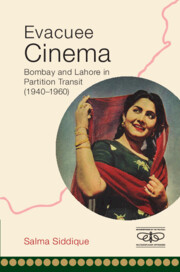Book contents
- Frontmatter
- Dedication
- Contents
- List of Figures
- Acknowledgements
- Introduction: A Moving Picture
- 1 The All-India Ambitions of Lahore
- Part 1 The Secular Stance of Bombay
- Part 2 Between Bombay and Pakistan
- Conclusion: Evacuee Cinema
- Appendix: Three Film Transcripts from the Fazli Family Collection
- Filmography
- Bibliography
- Index
5 - The Partition Romance: Meena and the Shorey Comedies
Published online by Cambridge University Press: 11 October 2022
- Frontmatter
- Dedication
- Contents
- List of Figures
- Acknowledgements
- Introduction: A Moving Picture
- 1 The All-India Ambitions of Lahore
- Part 1 The Secular Stance of Bombay
- Part 2 Between Bombay and Pakistan
- Conclusion: Evacuee Cinema
- Appendix: Three Film Transcripts from the Fazli Family Collection
- Filmography
- Bibliography
- Index
Summary
The Hindi screwball comedy was a short-lived and forgotten genre of the Bombay film enterprise in the late 1940s and the early 1950s. With debts not only to Hollywood but also to the pre-partition Lahore studios, these films comprised the post-partition oeuvre of a refugee film-maker, Roop Shorey, and were iconically linked with the lead actress, Meena. Privileging an unconventional female star with a flair for slapstick humour, the Shorey comedies emerge as a striking cultural negotiation of a historical experience, which was grim and gendered. Here the professional and conjugal relationship of a Muslim Meena and a Hindu Roop was remarkable for its disruption of communal boundaries during the partition decade when both communities were cast in positions of acute antagonism. While the Meena–Roop team was central to the Shorey comedies, these were also underwritten by a larger collaboration of film refugees driven out of Lahore into Bombay. Partition is critical to their collaborative work, not as a cataclysmic force that accidently brought them together, for their collaboration long preceded the partition induced migration, but for the evacuee experience that infused their collective film-making work.
Two aspects of partition come to fore in recovering the stardom and career of Meena Shorey. First, the concentrated and extended violence against women, recast as keepers of national honour and markers of boundaries, accentuated partition as a gendered experience. Ritu Menon and Kamala Bhasin's work draws attention to ‘the figure of the abducted woman (who) became symbolic of crossing borders, and of violating social, cultural and political boundaries’. This piteous partition figure is the historical underside of Meena who actively changed religious identities and national locations. The second aspect is detailed by Vazira Zamindar as ‘the bureaucratic violence of drawing political boundaries and nationalising identities’, which impinged on the mobility and fluidity characteristic of the colonial empire. Born as colonial Indians who moved across the film centres of Bombay, Calcutta and Lahore, Roop and Meena died as circumscribed citizens of India and Pakistan, respectively. As against the stark identity logics of partition, a productive cosmopolitanism emerges in the Shorey comedies of post-partition Bombay. In Peter van der Veer's account, seen through the lens of colonial modernity, cosmopolitanism is defined as a ‘form of improvisation, involving openness and mobility’.
- Type
- Chapter
- Information
- Evacuee CinemaBombay and Lahore in Partition Transit, 1940–1960, pp. 144 - 175Publisher: Cambridge University PressPrint publication year: 2023



